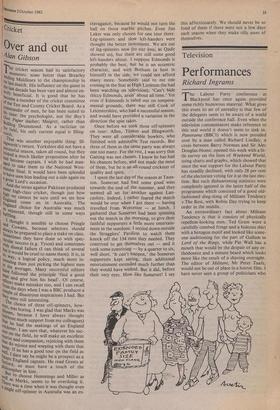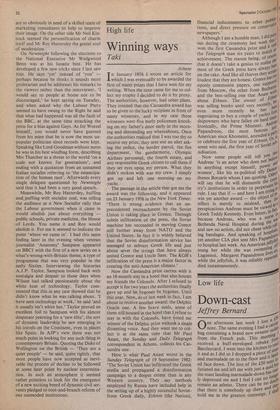Television
Performances
Richard Ingrams
rrhe Labour Party conference at
1 Blackpool has once again provided some richly humorous material. What gives this event its air of unreality is that few of the delegates seem to be aware of a world outside the conference hall. Even when the television commentators make reference to this real world it doesn't seem to sink in. Panorama (BBCI) which is now presided over by a man called Richard Lindley, a cross between Barry Norman and Sir Alec Douglas-Home, opened this week with a lit- tle survey on the lines of Weekend World, using charts and graphs, which showed that since the war support for the Labour Party has steadily declined, with only 28 per cent of the electorate voting for it at the last elec- tion. But such disheartening statistics were completely ignored in the latter half of the programme which consisted of a good old- fashioned ding-dong of Militant Tendency v The Rest, with Robin Day trying to keep order in the middle.
An extraordinary fact about Militant Tendency is that it consists of physically repellent-looking men. Ted Grant wore a carefully combed fringe and a hideous shirt with a hexagon motif and looked like some- one auditioning for the part of Gollum in Lord of the Rings, while Pat Wall has a mouth that would be the despair of any or- thodontist and a minute beard which looks more like the result of a shaving oversight. The editor of Militant, Mr Peter Taafe, would not be out of place in a horror film. I have never seen a group of politicians who
are so obviously in need of a skilled team of marketing consultants to help to improve their image. On the other side Mr Neil Kin- nock seemed the personification of charm itself and Mr Roy Hattersley the genial soul of moderation.
On Newsnight following the elections to the National Executive Mr Wedgwood Benn was at his lunatic best. He has developed a few new tricks since I last saw him. He says 'yer' instead of 'you' perhaps because he thinks it sounds more proletarian and he addresses his remarks to the viewers rather than the interviewer. 'I would say to people at home not to be discouraged,' he kept saying on Tuesday, and when asked why the Labour Party seemed to have swung to the Right he said that what had happened was all the fault of the BBC, at the same time attacking the press for a bias against Gays. As for Worzel himself, you would never have guessed from his mien that he is now the most un- popular politician since records were kept. Speaking like Lord Goodman without notes he was in his best windbag form, describing Mrs Thatcher as a threat to the world 'on a scale not known for generations', and ending with a quotation from an unnamed Italian socialist referring to 'the emancipa- tion of the human race'. Afterwards every single delegate questioned by Newsnight said that it had been a very good speech.
Meanwhile, Mr Roy Hattersley, huffing and puffing with socialist zeal, was telling the audience at a New Socialist rally that the Labour government when it came in would abolish just about everything '- public schools, private medicine, the House of Lords. You name it and Roy would abolish it. For me it seemed to indicate the point `where we came in'. I had this same feeling later in the evening when veteran journalist 'Anatomy' Sampson appeared on BBC] with the first of a new series on a what's-wrong-with-Britain theme, a type of programme that was very popular in the early Sixties. Interviewing the historian A.J.P. Taylor, Sampson looked back with nostalgia and despair to those days when Wilson had talked passionately about the white heat of technology. Taylor com- mented that this in any case showed that he didn't know what he was talking about. 'I have seen technology at work,' he said 'and it usually isn't white hot.' Taylor proved an excellent foil to Sampson with his almost desperate yearning for a 'new elite', the sort of dynamic leadership he saw emerging in his travels on the Continent, even in places like Spain. In AJP's view there was not much point in looking for any such thing in contemporary Britain. Quoting the Duke of Wellington on the British — 'They are a quiet people' — he said, quite rightly, that most people have now accepted as inevi- table the process of decline to be followed at some later point by nuclear extermina- tion. In such an atmosphere it seemed rather pointless to look for the emergence of a new exciting breed of dynamic civil ser- vants pledged to root-and-branch reform of our outmoded institutions.







































 Previous page
Previous page